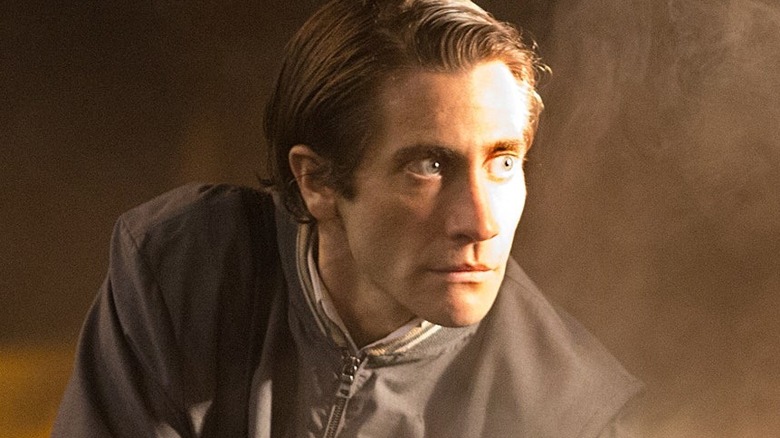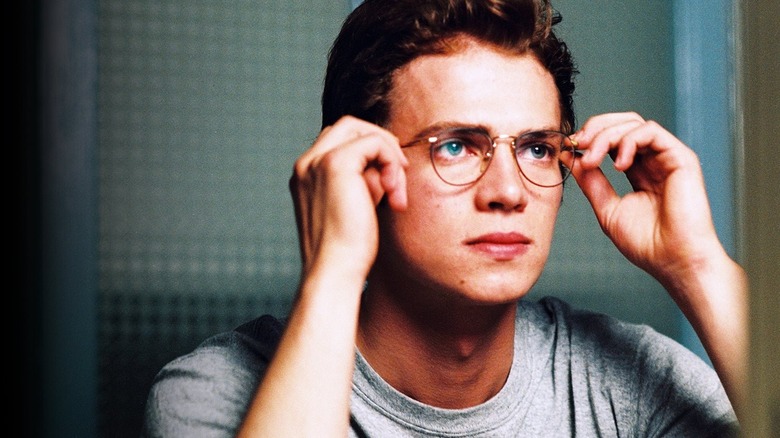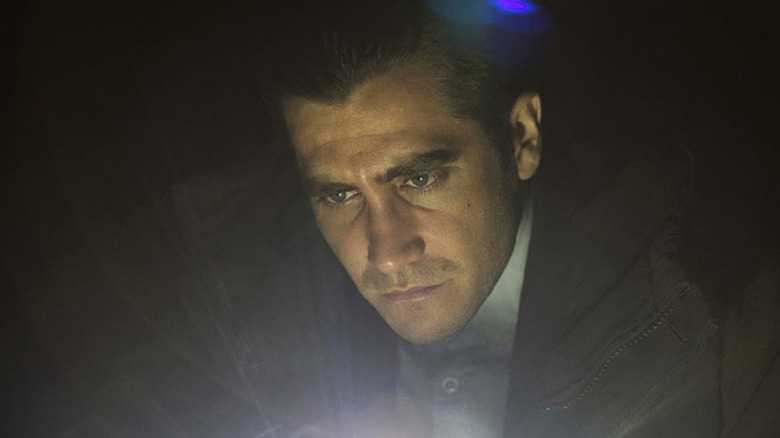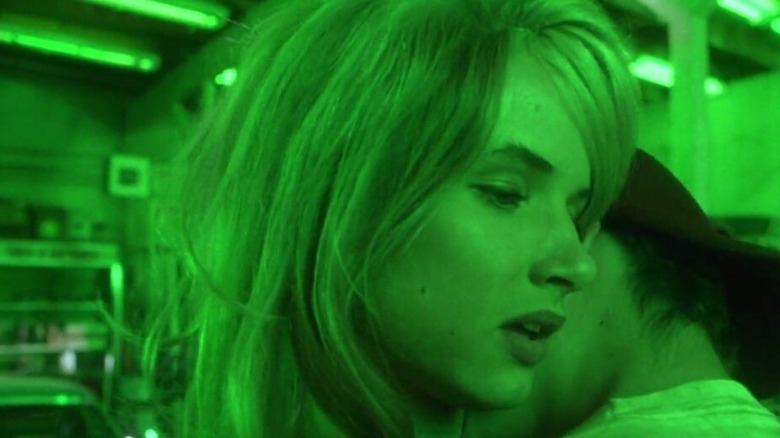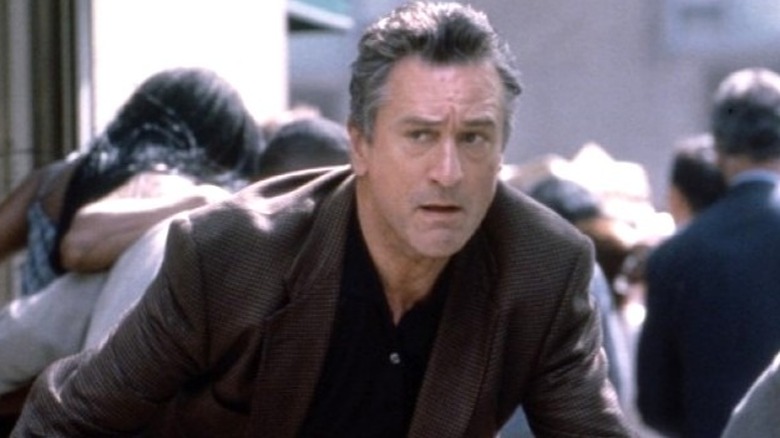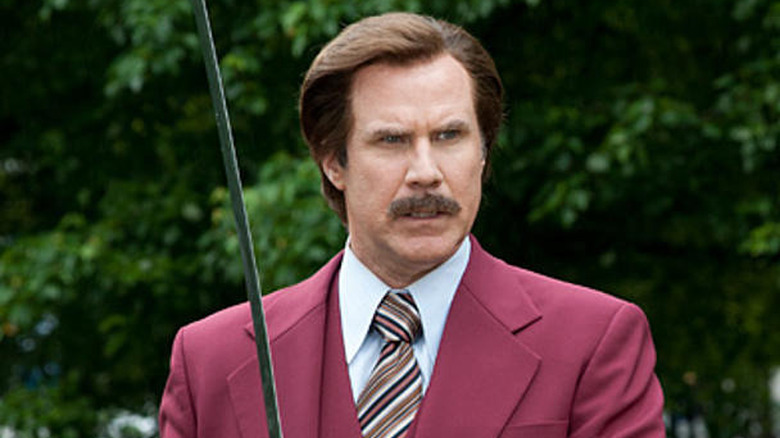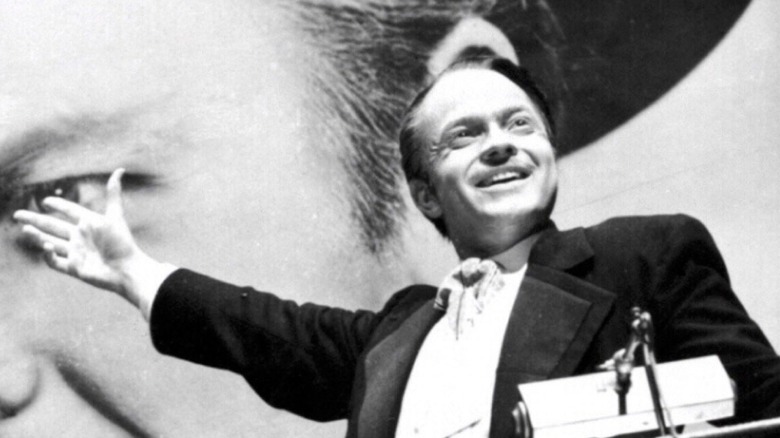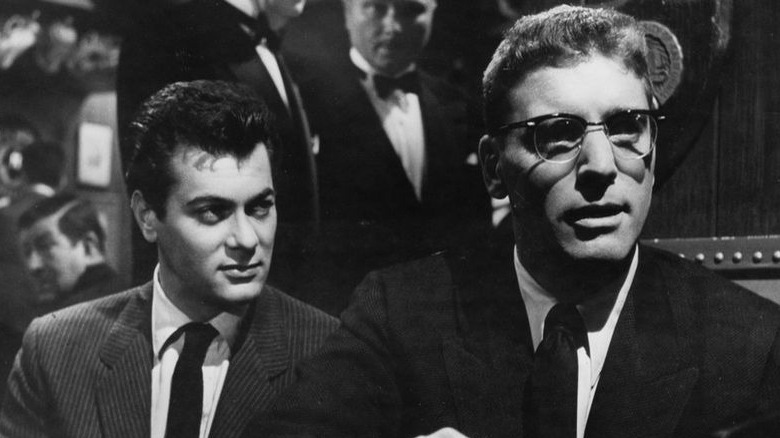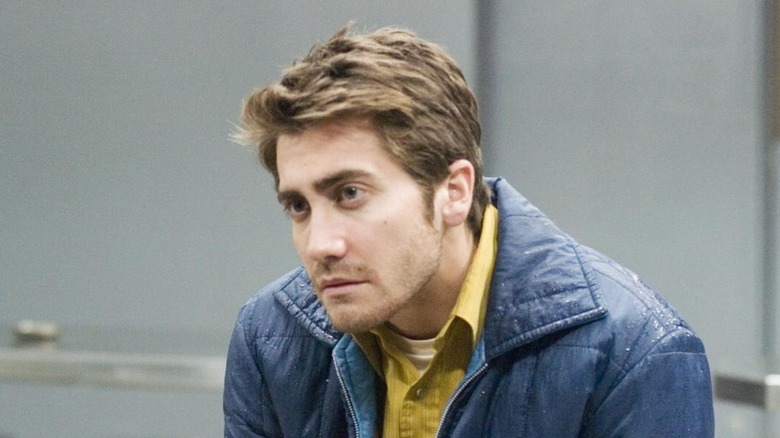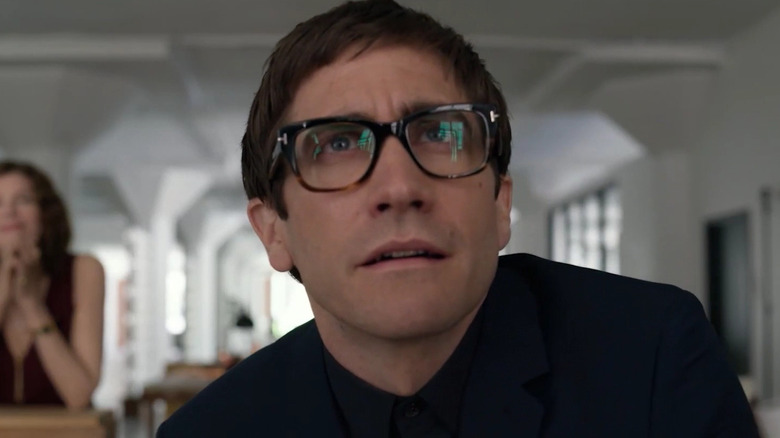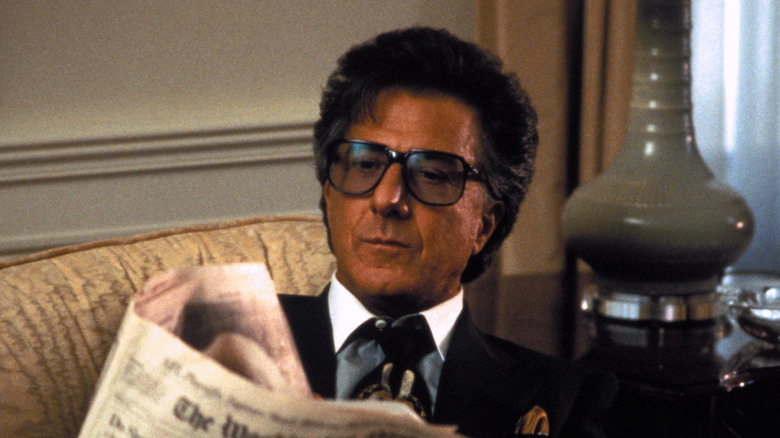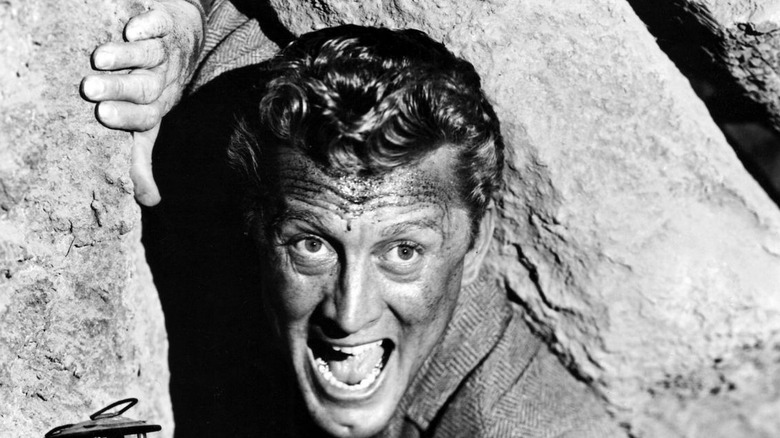Movies Like Nightcrawler That Are Definitely Worth Watching
Dan Gilroy's "Nightcrawler" dropped in 2014, a year in which Americans by and large trusted the media. That statement feels false, and yet not only did the 2021 Edelman Trust Barometer find that fewer than half of U.S. residents trust mainstream news sources, but that this is actually the first time that has happened in the nation's recent history. It's easy to see why. The country has moved past "fake news" and into "post-truth," with people turning to sources that support their inherent beliefs instead of the ones offering unassailable facts. Pundits champion conspiracy theories. Major outlets run doctored footage, which is retweeted by government officials. In 2014, "Nightcrawler" was a thriller. Now, the story of a depraved reporter willing to do or say anything for a story feels like a docudrama.
The good news? Hollywood's annals reveal a long fascination with the intersection of reporting and storytelling. It's the subject of an all-time cinema classic. It becomes a bigger topic in the wake of the Cold and Vietnam Wars; and it amplifies to a fever pitch when new forms of media, be they cable or social networks, take deeper root in modern society.
To enjoy "Nightcrawler" is to share this preoccupation. So, whether you crave suspense, seething social critique, or the artistic stylings of Dan Gilroy and Jake Gyllenhaal, here are 11 movies like "Nightcrawler" that are definitely worth watching.
Shattered Glass
"Nightcrawler" is, at its core, about sensationalism, a strain of news reporting that prioritizes ratings and circulation counts over facts and integrity. The New Republic magazine, by contrast, was a celebrated institution that prided itself on fact-checking. The two hardly seem related, but, as Billy Ray's "Shattered Glass" proves, they can be. And they were.
The true story of Stephen Glass, a 24-year-old con man who fooled editors for years by fabricating both events and quotes for more than 25 published articles, "Shattered Glass" is Ray's first and best political docudrama. Like "Nightcrawler," it creates suspense out of a charming man's lies. Like "Nightcrawler," it is haunted by what makes said liars tick. Unlike "Nightcrawler" — or Ray's own "The Comey Rule" — it does not find an easy villain in its protagonist or larger narrative.
As played by a career-best Hayden Christiansen, Glass is disarmingly sympathetic and nigh impossible to read. Where his own sense of the truth begins or ends is hard to discern; the movie doesn't try. Instead, it reminds us that facts are precious and vulnerable things quickly exacerbated by the desires of those who report them. It's a lesson that, in 2021, we are still learning every day.
Prisoners
The news reports tragedies; it experiences them by proxy. That is the media's blessing and its curse — distance. There is no distance in Denis Villeneuve's "Prisoners." From the jump, characters are filmed in extreme close-up. They are unable to escape rage, violence, and all-consuming loss when a girl and her friend go missing. By film's end, they are defined by those calamities. It's who they are now.
If this sounds overwhelmingly dark, then I've described "Prisoners" correctly. It's also a masterpiece. The 2012 film asks the same questions that "Nightcrawler" ponders — how do evolving stories stunt our growth or develop us? Why do good men break bad? — but does so with a baroque edge that has little equal in contemporary cinema. Both movies share, however, exceptional Jake Gyllenhaal performances.
For the last decade-plus, there have been two separate strains of Gyllenhaal acting: weird and mainstream. In "Prisoners," those strains hybridize. Detective Loki is a moody, simmering mess whose dogged attempts to find the lost girls reveals a bruised heroism. It's some of the actor's finest work, and just one component of many that make "Prisoners" worth watching.
Natural Born Killers
"Nightcrawler" wasn't the first film to explore the line between reporting stories and exploiting them. Neither was Oliver Stone's "Natural Born Killers." But no other film released in the last 50 years has set fire to that line, or shifted where it sits in daily life. And I'm not sure that's a good thing.
There is zero question that, for film buffs, "Natural Born Killers" is a necessary watch, but it must also be said that there are swaths of critiques leveled against "Natural Born Killers," all of them valid. Though the film eviscerates the vampiric coverage of abominable crimes (in the instance of this film, outlaws Mickey and Mallory's crime spree), it also revels in those crimes cinematically. Some of that's due to what may be a fundamental misunderstanding of writer Quentin Tarantino's intentions, but other gestures, like Stone's cringey, stereotype-laden portrayal of native culture, feel off from the jump.
And yet, the film's thesis — that humans will normalize their worst excesses in order to be seen the way they want — is still frighteningly potent. Though it's broad-stroke style lacks nuance, it also makes it clear that Mickey and Mallory are the tip of an iceberg whose depth is almost unknowable. That is the most lasting statement made by "Natural Born Killers," and it's one worth seeing laid out on screen at least once.
15 Minutes
Where "Natural Born Killers" is undoubtedly the work of an idiosyncratic craftsman, "15 Minutes" has more rough edges than the lumber section of Home Depot. Of all the films that appear on this list, it's the one you're least likely to dub "quality." And yet, it's a wretched stunner in its own way, a film that anticipated the worst of social media and the media's coverage of horrifying violence alike. This film was released before the War on Terror, the reality TV boom, and Kyle Rittenhouse, but it feels like a reaction to all of them.
Again, this isn't a ringing endorsement, but it does mean the film is worth watching if "Nightcrawler" and its deliberately perverse look at sensationalistic journalism delivered for you. "15 Minutes" tries to work you over. It's immature. It's sneaky. In its own way, it's essential. Those are qualities that always make a movie worth watching.
Anchorman 2
The story of Henny Penny, more commonly known in the United States as "Chicken Little," is a moral parable. In it, a tiny bird becomes convinced that the sky is falling and causes panic among the townspeople he lives with. In the "happy" version of the tale, he is rewarded by the sky actually collapsing, becoming a shining example of having courage in your convictions. In the darker ending, Chicken Little is eaten by foxes. The theme that endures across both versions? Imminent doom causes an everlasting fissure in modern life, even when it's fake.
In "Anchorman 2," Ron Burgundy and the Channel 4 news team become deathly afraid of being irrelevant. Their solution? The 24-hour news cycle, which they inadvertently invent during a graveyard shift. There are many moments when Adam McKay's "more is more" approach to the 2013 sequel feels more numbing than laugh-inducing — this isn't one of them. The Channel 4 news team are, in their own way, as desperate (and nearly as depraved) as Leo Bloom in "Nightcrawler." They just happen to be in a comedy. Which means we get to genuinely laugh at their ecstatic coverage of the women's tennis circuit or watch their war with rival journalists lead to (funny) destruction and murder. It's not clear whether this is the happy or dark ending for "Anchorman 2" but, in both, the sky is falling — every day. for the rest of our lives
Citizen Kane
To be honest, explaining why "Citizen Kane" is worth watching feels trite and ridiculous. In the words of Pusha T, "If you know, you know." That said, it's worth exploring how Orson Welles' unassailable classic is a precursor to Dan Gilroy's lurid "Nightcrawler." Charles Foster Kane proves, on more than one occasion, just how mailable public opinion can be for members of the media. And, like Leo Bloom in "Nightcrawler," he understands that shaping those opinions means presenting yourself as one of the people. "People such as yourself, who reached the top of the mountain didn't just fall there," Bloom says, although it might as well be Kane speaking. "My motto is, if you want to win the lottery, you have to make the money to buy the ticket."
Journalism is the ticket for both Leo and Charles Foster Kane. Throughout "Citizen Kane," the publishing magnate espouses his integrity while speaking truth to power — which, of course, is himself. What's more, both men aim to capture the hearts of their respective cities even as the corroding valves within their own mercilessly shape the places they live within. Don't just watch "Citizen Kane" because it's brilliant. Watch it to forever see the links between it and your local news broadcast.
Sweet Smell of Success
The dark heart of "Nightcrawler" is palatable. It goes down smoother than you would expect. It's a feast for the senses, not a meal that feels excruciating. In many ways, this gives the movie its power. CNN and its brethren would hardly be so compelling if they weren't nice to look at, if they didn't entice a pleasurable reaction through presentation alone.
"Sweet Smell of Success," which is one of the darkest and most cynical films about journalism ever committed to film, is just as easy to digest. It was even turned into a short-lived Broadway musical starring all-time great John Lithgow and a future mainstay of newsroom movies, Brian D'Arcy James. But its plot, which centers around the sleazeball publisher J. J. Hunsecker (Burt Lancaster, riffing on real-life New York print legend Walter Winchell) and his attempt to ruin a journalist (Tony Curtis) who woos his daughter, is full of pitch-black twists and incendiary reveals. Lancaster and Curtis go for broke throughout, and the film's inclusion in the National Film Registry by the Library of Congress for being "culturally, historically, or aesthetically significant" should give a sense of how strong the movie is as a whole. Enjoy it sooner rather than later.
Zodiac
If you like Jake Gyllenhaal in "Nightcrawler" and its pitch-black California narrative, then David Fincher's "Zodiac" is must-watch stuff. Arguably the director's best film, it's a searing true crime tale that only grows more and more relevant with each passing year. What makes it a companion to "Nightcrawler," however, is its paralyzing suggestion that journalistic integrity and the dogged pursuit of truth can lead to the madness and self-destruction that will eventually mar characters like Robert Grayson and Leo Bloom.
And as good as Jake Gyllenhaal is as Grayson (and as good as he is in "Nightcrawler," really), this film's thesis is no clearer than in the arc of Paul Avery (a career-best Robert Downey Jr.), a reporter whose attempt to unmask the Zodiac Killer leads to the delivery of a harrowing and cryptic note that threatens Avery's death. The confidence that is Downey's stock-in-trade evaporates. We find him years later, emotionally broken on a houseboat, trapped in the throes of a story that has no answers. That's as, if not more, frightening than the "Zodiac" killer himself, and it's one of the reasons why Fincher's film should be seen and studied for years to come.
Velvet Buzzsaw
This one's for the Dan Gilroy fans and the Jake Gyllenhaal fans, the ones who sought out "Roman J. Israel, Esq." because Gilroy helmed it and defend Jake's work in "Bubble Boy" because Jake Gyllenhaal, bless him, goes pedal to the medal in "Bubble Boy." "Velvet Buzzsaw" sees the core talents behind "Nightcrawler" unleashed and diving recklessly into their Netflix-approved budget like Scrooge McDuck does gold. The result is a lush, lurid, and frequently unhinged skewering of both horror films and L.A.'s art scene.
Hyperbolic language aside, "Velvet Buzzsaw" really rides a remarkably high concept to its success: What if there were a slasher movie in which everybody who died thought they were the smartest and most clever person alive? No one in "Velvet Buzzsaw" has survival instinct; they have "intellect," and it gets almost all of them nowhere — especially Gyllenhaal as Morf, which might be the wildest performance of the actor's career. Taken in tandem with Nia DeCosta's "Candyman," "Velvet Buzzsaw" sets the world of high art on fire with verve and no shortage of charm. Unlike the paintings it skewers, Gilroy and Gyllenhaal combined low and high art with no hint of pretension. That's why both knocked "Velvet Buzzsaw" out of the park.
Wag the Dog
"I want the credit!" These four words comprise one of the funniest and most chilling lines from Barry Levinson's incendiary "Wag the Dog," a satire so ahead of its time that it feels like it still hasn't arrived yet. "Wag the Dog" finds spin doctor Conrad Brean (Robert DeNiro) enlisting a Hollywood director (Dustin Hoffman) to film a fake war that will be sold to the public as real in order to distract from the president's sex scandal.
The conceit is ridiculous, except it isn't. If you're reading this, you were likely alive in 2016. You know how not ridiculous this concept is. You've watched political candidates fear-monger. You've seen doctored footage treated like real evidence, and a president for whom credit was the primary currency. "Wag the Dog" gets it. And, in understanding just how deeply the news shapes the government — and vice versa — it should serve as a field guide for how to understand our modern age.
Ace In The Hole
The only film on this list to earn a place in the prestigious Criterion Collection, "Ace In The Hole" is described in both the Criterion's Blu-ray release and on its website as"one of the most scathing indictments of American culture ever produced by a Hollywood filmmaker ... a no-holds-barred exposé of the American media's appetite for sensation that has gotten only more relevant with time."
Dare I say that might be underselling it? "Ace In The Hole" is profoundly dark, the kind of film you show to someone who doesn't watch old movies because they find them "soft" or "not gritty enough." "Ace In The Hole" is corrosive. It gives Kirk Douglas the fiercest role of his career, the kind of part that reframes the entire way a person perceives a performer.
But it's the no-holds-barred ending that separates "Ace In The Hole" from almost any film that has come before or since. Without spoiling it, director Billy Wilder makes it clear that spectacle and speculation are the fuel for the modern media's fire, one that can become an inferno at any moment with little hope of going out. And if someone gets burned? Just another story to report on. The ratings rise; the blaze grows higher. This thesis is the secret weapon of "Ace In The Hole," and one that has endured for 70 years. It makes the film essential viewing.
